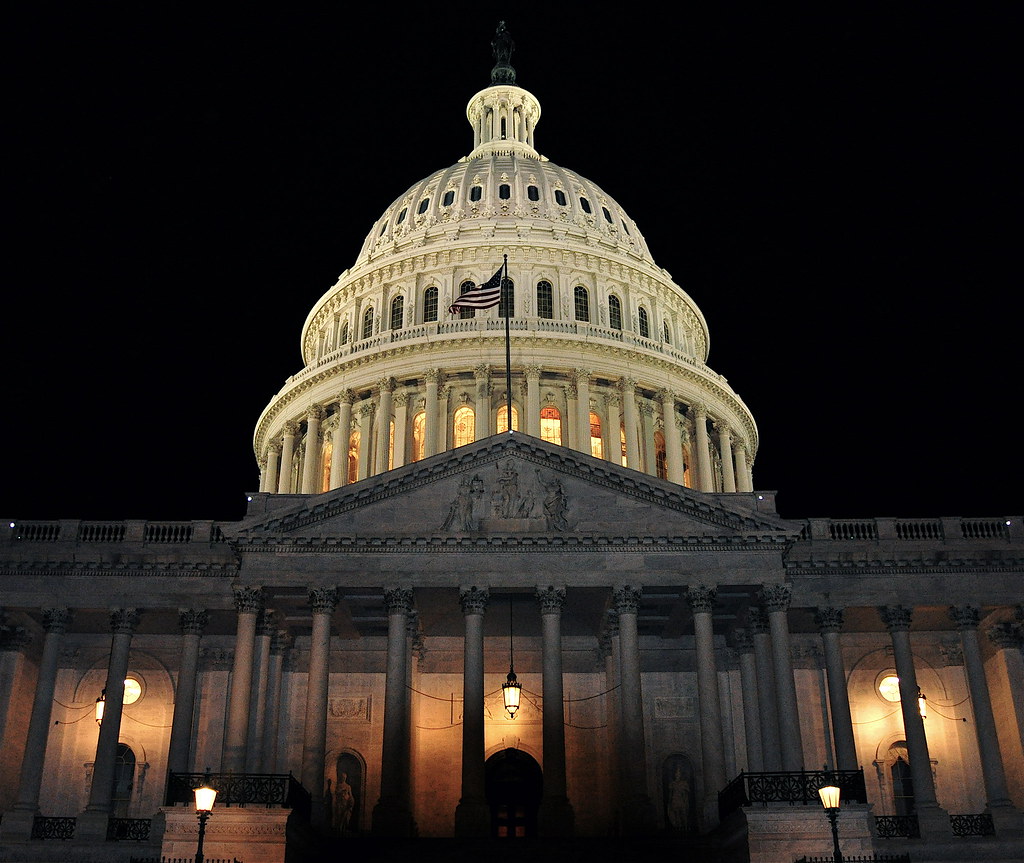Mueller Report Redactions: Will Congress Ever See All of the Mueller Grand Jury Material?
The wait is almost over. The Mueller report is set for release on Thursday morning. It’s already a number-one bestseller on Amazon. Congressional staffers are stockpiling booze and drafting take-out orders, anticipating a long night of reading.

Published by The Lawfare Institute
in Cooperation With

The wait is almost over. The Mueller report is set for release on Thursday morning. It’s already a number-one bestseller on Amazon. Congressional staffers are stockpiling booze and drafting take-out orders, anticipating a long night of reading. There is “breakdown-level anxiety” in the White House. Meanwhile, the rampant speculation about the report has focused as much about what won’t be in the public release as what will be. Here’s what we know about the redacted material: It’s separated into four categories, Congress wants it unredacted and it’s color-coded for convenience. We also know that the legal battle for information covered by one of those categories—Federal Rule of Criminal Procedure 6(e)—will be particularly thorny.
In his letter to judiciary committee chairmen Jerrold Nadler (D-N.Y.) and Lindsey Graham (R-S.C.) dated March 29, Attorney General William Barr indicated that there were four categories of material he is redacting in the version that is expected to be made available to Congress: (1) material subject to Federal Rule of Criminal Procedure 6(e) that cannot be made public; (2) classified information that implicates the sources and methods of the intelligence community; (3) information that is sensitive based on other ongoing law enforcement matters; and (4) information that would “unduly infringe” on the “personal privacy and reputational interests of peripheral third parties.” Nadler has indicated he intends to wait until the redacted report is delivered before making a decision about whether to issue a subpoena for the full report. He also set forth his views in a letter to Barr on April 1 regarding why the judiciary committee should be entitled to see the entire unredacted report and underlying grand jury materials.
For the latter three categories of redacted information, there is no legal bar to the attorney general providing such material to members of Congress. Members routinely review classified information, and they can review sensitive law enforcement related or personal information in a nonpublic setting. They will almost certainly demand such information, and a back-and-forth between the committee and the Department of Justice will likely ensue, potentially for weeks, on these three categories of information. On April 10, Barr indicated in a congressional hearing that he would work with the judiciary committees of the House and Senate to view some of the redacted portions of the report: “I am willing to work with the judiciary committees to see if there is a workaround that could address any concerns or needs that they have.” Barr also said grand jury information is the “most inflexible” category for a speedy release.
Why is the first category of material that Barr is redacting—material subject to section 6(e) of the Federal Rules of Criminal Procedure (FRCP)—the “most inflexible”? While there is historical precedent for the House judiciary committee receiving such information, an intervening case issued by the U.S. Court of Appeals for the D.C. Circuit on April 5 may make it considerably more difficult for the judiciary committees to receive it. If the House judiciary committee wants to have even a chance of reviewing the redacted 6(e) material, it will either have to convince Barr to make arguments to that effect to the court that oversaw the Mueller grand jury proceedings or else petition the court directly. Such litigation would take time, and the outcome is uncertain—especially if Barr decides to oppose the release to the committee.
Congress has managed twice to obtain federal grand jury information in prior special counsel investigations, as Nadler noted in an April 11 letter to Barr:
In every other instance where a federal grand jury was used to probe the alleged misconduct of a sitting president—namely, in the Watergate and Starr investigations—the Department of Justice worked with the relevant federal court to release the grand jury information to the House Judiciary Committee.
He isn’t wrong. But the legal and factual landscape surrounding those situations is distinct from the landscape surrounding the Mueller report. Given that the battle for access to Mueller’s 6(e) evidence will likely begin minutes after the report drops, it is worth exploring how Congress got its hands on such evidence in the past.
Rule 6(e) of the Federal Rules of Criminal Procedure
The FRCP are issued by the Supreme Court pursuant to the Rules Enabling Act. The current codified version of the act sets out a procedure under which the Supreme Court can propose changes to these rules, but creating, abolishing or modifying an evidentiary privilege has “no force or effect unless approved by Act of Congress.” Congress can also enact changes to the FRCP on its own initiative.
Under section 6(e) of the FRCP, certain people involved in a grand jury proceeding “must not disclose a matter occurring before the grand jury,” including the grand jurors themselves, the government attorney presenting the case to the grand jury, the court reporter and other technical people involved in the proceeding itself. (A judge oversees, but is not present in, grand jury proceedings. Those who testify before the grand jury are not under a secrecy requirement.) The section then sets out certain exceptions to the secrecy requirement that apply to government attorneys and grand jurors. For example, information can be provided to “an attorney for the government for use in performing that attorney’s duty.” A person to whom information is disclosed under this exception may use such information “only to assist an attorney for the government in performing that attorney’s duty to enforce federal criminal law.”
In addition, a judge overseeing the grand jury proceedings can authorize disclosure of a grand jury matter for certain purposes, including:
- (i) preliminarily to or in connection with a judicial proceeding;
- (ii) at the request of a defendant who shows that a ground may exist to dismiss the indictment because of a matter that occurred before the grand jury;
- (iii) at the request of the government, when sought by a foreign court or prosecutor for use in an official criminal investigation;
- (iv) at the request of the government if it shows that the matter may disclose a violation of State, Indian tribal, or foreign criminal law, as long as the disclosure is to an appropriate state, state-subdivision, Indian tribal, or foreign government official for the purpose of enforcing that law; or
- (v) at the request of the government if it shows that the matter may disclose a violation of military criminal law under the Uniform Code of Military Justice, as long as the disclosure is to an appropriate military official for the purpose of enforcing that law.
The release of grand jury information to Congress does not obviously fit under any of these exceptions.
Precedents for the Judiciary Committee Receiving 6(e) Grand Jury Material
Our colleagues have written extensively on the Watergate road map, a 55-page document written by Special Prosecutor Leon Jaworski’s staff to guide the House judiciary committee through grand jury evidence implicating Nixon in the Watergate scandal. As the document itself indicated, it contained evidence that was “within the primary jurisdiction of the House of Representatives Committee on the Judiciary in its present investigation to determine whether sufficient grounds exist for the House of Representatives to exercise its constitutional power to impeach Richard M. Nixon, President of the United States.”
The road map and accompanying grand jury evidence were submitted to U.S. District Court Judge John Sirica on March 1, 1974. A few weeks prior, the House had voted 410-4 to open a formal impeachment inquiry into Nixon. As Benjamin Wittes detailed, on March 8, House Judiciary Chair Peter Rodino formally requested the materials submitted to Sirica, noting that the committee had unanimously authorized him to do so. The committee also sent John Doar, an attorney whom the committee majority had hired to oversee the Watergate investigation, and his Republican counterpart Albert Jenner, to inform the court of the committee’s position that the grand jury’s information was potentially vital to the impeachment inquiry. Doar and Jenner also informed the court that the committee had adopted procedures that allowed for the “security and confidentiality” of the road map materials “until such time as the Committee in the course of meeting its constitutional responsibility” decided that the material be presented to the committee members for consideration. Judge Sirica ruled to release the road map to the judiciary committee. His ruling on March 18 partially turned on a few key factors.
First, he noted that the road map drew “no accusatory conclusions” and contained “no recommendation, advice or statements that infringe on the prerogatives of other branches.” Barr noted in his letter to Congress that, in discussing potentially obstructive conduct by President Trump, the Mueller report “describe[s] the facts of [the] obstruction investigation without reaching any legal conclusions.” We also know that “this report does not conclude that the President committed a crime, it also does not exonerate him.” But we will have to wait for the actual report to see how closely—or not—Mueller followed the road map’s bare bones approach.
Sirica emphasized several times that Nixon’s lawyer, James St. Clair, did not object to the release of the report—according to Watergate expert Stephen Bates, Sirica was actually quite surprised by this. Many were similarly surprised when President Trump said it “wouldn’t bother him at all” if the Mueller report were completely released and that such decision were “up to the attorney general.” What Trump’s lawyers say after the release of the report is a somewhat different matter. In the hours after Barr’s letter to Congress offering the report’s top-line conclusions, Trump called the report a “complete and total exoneration” of his conduct. But since reporting emerged that the document may be more damaging than Barr portrayed in his letter, the president has returned to arguing that the report was written by “Angry Democrats” and calling the investigation a “Witch Hunt.” And Trump’s attorney Rudy Giuliani has said that the White House is preparing a lengthy rebuttal to the report—presumably before anyone at the White House has read the actual document.
Judge Sirica also noted that “[t]he House Judiciary Committee through its Chairman has made a formal request for delivery of the Report materials,” suggesting that the presence of a formal request to the court weighed on his decision to release the information. (Benjamin Wittes has proposed that Nadler write a similar letter.)
In his ruling, Sirica devoted extensive attention to the notion of “judicial proceeding,” and whether a judicial proceeding was unfolding in the House judiciary committee. In examining instances in which grand jury information had been disseminated to Congress for the purpose of impeaching or disbarring members of the federal judiciary, Sirica concluded that there was “convincing precedent to demonstrate that common-law practice” permitting disclosure. He added, “It seems incredible that grand jury matters should lawfully be available to disbarment committees and police disciplinary investigations and yet be unavailable to the House of Representatives in a proceeding of so great import as an impeachment investigation.” Given the weight Sirica puts on the matter, it is notable that there is no pending impeachment inquiry currently.
H.R. Haldeman, Nixon’s former White House chief of staff who was later tried for perjury, conspiracy and obstruction of justice in connection with Watergate, filed for a writ of mandamus to prohibit Judge Sirica from transmitting to the House judiciary committee the sealed report and accompanying grand jury evidence. In Haldeman v. Sirica, the D.C. Circuit upheld Sirica’s decision in an opinion that was curiously vague, stating that “[w]e are in general agreement with [Sirica’s] handling of these matters, and we feel no necessity to expand his discussion.” The D.C. Circuit went on to note that the president had not objected to Sirica’s action, and that the special prosecutor must have concluded that his interests in successful prosecutions could be reconciled with the transmittal of the information for consideration in the impeachment process.
Alongside the Watergate road map, Nadler also invokes the Starr Report, another large document that also arrived at the House chock full of grand jury material. But this document actually has very little in common with the upcoming Mueller report, legally speaking. True, Starr worked with a federal court to release his report, but the statute under which he did so no longer exists. The now-lapsed Independent Counsel Statute (28 U.S.C.§591-599) mandated that he directly petition a special division of the D.C. Circuit, impaneled for the purpose of monitoring an independent counsel, to allow him to transfer grand jury information to Congress. Under Section 595(c) of the statute, Starr was required to “advise the House of Representatives of any substantial and credible information which such independent counsel receives, in carrying out the independent counsel’s responsibilities under this chapter, that may constitute grounds for an impeachment.” Pursuant to that title, Starr requested permission on July 2, 1998, from the special division to transfer information to Congress that included grand jury materials. On July 7, the division granted him that permission, resting its full order on 28 USC § 595(c). (The order can be found in Tab B for the Appendix to the Starr Report.) The statute was terminated in 1999, so it will be of little help to Chairman Nadler and his committee.
The transfer of the Watergate road map is a more instructive precedent for the committee, but Nadler faces a new obstacle that Rodino didn’t have to deal with.
Impact of the McKeever Case on 6(e) Material in the Mueller Report
On April 5, the D.C. Circuit threw a bit of a wrench in 6(e) disclosure when it issued its opinion in McKeever v. Barr. (See a summary of the case here on Lawfare.) This ruling narrowed the grounds on which a court could release grand jury information to the House judiciary committee, but it does not preclude it altogether.
McKeever is a writer and researcher who petitioned the district court for the release of grand jury records in a case related to the disappearance of a Columbia University professor in 1965. The district court asserted it had “inherent supervisory authority” to disclose grand jury matters that are historically significant but denied McKeever’s request because it did not satisfy the multifactor test set out in an earlier case, In re Craig. The D.C. Circuit overruled the district court’s approach, finding that the district court does not have inherent authority to release grand jury information but, rather, is limited to the exceptions to grand jury secrecy listed in 6(e). McKeever does not necessarily preclude the House judiciary committee from obtaining grand jury material, however—in footnote 3 of the majority opinion, the court distinguishes Haldeman by exploiting the vagueness of the decision and reading the release of information in that case to the House judiciary committee as fitting within the Rule 6(e) exception for judicial proceedings. (Notably, Judge Sri Srinivasan’s brief dissent in McKeever reads Haldeman as ratifying Judge Sirica’s decision to release grand jury material under the court’s inherent authority.)
Applying McKeever to the Mueller report, it is clear that the case does not necessarily preclude the House judiciary committee from receiving 6(e) material, but it is also not clear that the committee would receive the material. The issue would need to be decided by the court overseeing the Mueller grand jury, and it is not clear what the outcome would be.
Practically speaking, the first question is who would petition the court to release the information. In theory, Attorney General Barr could ask the court overseeing the grand jury to release the 6(e) information to the House judiciary committee because the information fits within the exception that allows release “preliminarily to or in connection with a judicial proceeding”—citing the potential for impeachment proceedings as being akin to a judicial proceeding.
Nadler has argued that his committee’s current efforts could be considered “preliminary” to a such a proceeding in the sense that they require the information in the Mueller report to help determine “whether or not to initiate an impeachment,” adding, “we may very well decide not to do that. But we need all of this information.” Attorney General Barr has already indicated in testimony before Congress that he does not plan to ask the district court to allow him to release the 6(e) information to the judiciary committee prior to providing the redacted report to Congress. Instead, he said, “The chairman of the judiciary committee is free to go to court if he feels one of those exceptions is applicable.” So it will likely be up to the committee to make this argument before the court. But victory in that course of action is far from certain. Stephen Bates has observed that:
McKeever indicates that Congress probably needs to invoke the “judicial proceeding” exception if it wants grand jury evidence. While impeachment is a judicial proceeding, congressional oversight is not, according to a D.C. district court case from 1981—and nothing in McKeever suggests otherwise.
There are plenty of reasons Nadler would prefer Barr to make the “releasing 6(e)” argument for him. After all, a united executive branch and legislative branch request for the information has a greater likelihood of success than a drawn-out legal battle between the branches. And opening an impeachment inquiry would be—to put it mildly—politically explosive. Not to mention against the wishes of his party’s leadership. But Nadler may be running out of options if he wants to see the grand jury material in the document. To account for the McKeever decision, he will need to argue, as he has stated he is considering, that the court should release the information to the committee under the “preliminarily to or in connection with a judicial proceeding” exception. If the court is skeptical that the congressional investigation and attendant subpoenas are not sufficient, having an open impeachment inquiry may be the strongest argument in favor of applying the “judicial proceeding” exception. If Nadler hopes to obtain 6(e) information in the Mueller report, he should take other steps too to align his situation more concretely with Rodino’s. Most importantly, he should request the information directly from the D.C. district court. Finally, if Watergate is any guide, the committee is much more likely to be successful if the Department of Justice and the president do not object to the transmittal of the materials.
It is not at all clear that Barr or President Trump would take that position.






